Jersey Boys (R)
27/06/14 23:43 Filed in: 2014
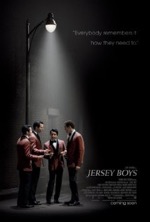
Starring: John Lloyd Young
June 2014
This review was originally tweeted in Real-time from the back row of a movie theater and appears @BackRoweReviews. Though efforts were made to tease rather than ruin this movie’s memorable lines and moments, some spoilers may exist in the following evaluation. The original tweets appear in black, while follow-up comments appear in red. For concerns over objectionable content, please first refer to one of the many parental movie guide websites. All ratings are based on a four star system. Happy reading!

A nick at the barber shop. “What’s a little blood between friends?”
Tapping Christopher Walken for this film was a casting coup. He was born to play this part…an absolutely pitch-perfect performance.
Three ways out of the neighborhood, two types of women. A severe world.
My parents were born and raised in that world. I’ve spent my entire adult life trying to divest myself from such a rigid worldview.
Jam session on the organ is a cool scene.
But comes with a price.
Manually loading bowling pins...what a job.
And the identity of the young teenage boy loading the pins is sure to take you by surprise.
A gift for the newest member of the group...a left shoe.
If you sense a sleight, you sense correctly.
“The musical equivalent of room service.” Always read the fine print.
The Four Felons get tossed out of the bowling alley, but a “sign” changes their fortunes.
Actually, The Four Felons, cast as an aspersion, is far better than the group’s original name…The Four Lovers. As a male quartet, did they not consider how such a name could be misconstrued? Ah, the innocent 50s.
A “Jersey contract” threatens to tear the group apart.
Valli’s pep talk to his daughter hits the right emotional chord.
And is really the only scene in the movie that contains any emotional resonance.
Final analysis: a well crafted spotlight on Valli and his group.
Rating: 3 out of 4 stars. An immersive film that captures the sound and mood of the period in focus.
I must admit, I’ve never been much of a Frankie Valli fan. His high falsetto work, especially on songs like “Walk Like a Man,” is like fingernails on a chalkboard to my ears. Musical preferences aside, I’m now a fan of the singer, thanks to the insightful portrait of Valli’s life and career, brought to us by the man who once tried his hand at singing in “Paint Your Wagon” (1969) and then wisely stuck with his day job. It’s evident that Eastwood has a profound affection for the subject matter and his attention to historical detail is peerless. The film is saturated with nostalgia for the music and mores of the 50s and 60s and the sets, costumes, cars, etc, are all period appropriate to a superlative degree. Those familiar with Valli’s greatest hits will find it nearly impossible to refrain from singing or humming along when snippets of those songs, played in chronological progression of course, blast from the theater speakers. Despite the many qualities that recommend the movie, however, it remains strangely unmoving. The same can be said of Eastwood’s previous directorial effort, J. Edgar (2011)…a finely mounted and acted period piece that provides a vivid history lesson without really engaging the heart in any meaningful way. Eastwood needs to reevaluate Changeling (2008) to see what’s been missing in his recent films. The story here is remarkably similar to that of a concurrent group, The Temptations (as chronicled in the 1998 self titled TV miniseries). It seems that many popular acts from this era had a meteoric rise to fame followed by a catastrophic meltdown, instigated by the group’s requisite prima donna: David Ruffin for The Temptations and Tommy DeVito for the Four Seasons. But besides the group’s internal drama and Valli’s relational challenges on the home front, this movie resides on the outskirts of substantive emotion. Indeed, despite the film’s ability to engage the ear (music) and mind (human interest story of a group of guys trying to parlay their talent into fame), the movie plays like a Lifetime movie (with a ton of expletives added) punctuated by dramatized Time Life archival music video clips. As things stand, the movie is a finely produced “true story” that’s memorable more for its music than its standard story or static direction. If you’re in the mood for this type of movie, Jersey might satiate your hankering; otherwise you’re sure to be disappointed by its predictable plot and surficial story. In other words, you might want to save your money and make this one a rental. Capiche?
Personal note: My uncle was lead trumpet for Valli’s touring group for a couple years in the mid-sixties, so it was fun for me to get a glimpse of what his life might have been like during that stretch of time.
How to Train Your Dragon 2 (PG)
19/06/14 23:03 Filed in: 2014
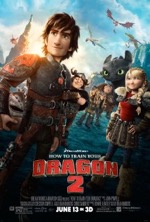
Starring: Jay Baruchel
June 2014
This review was originally tweeted in Real-time from the back row of a movie theater and appears @BackRoweReviews. Though efforts were made to tease rather than ruin this movie’s memorable lines and moments, some spoilers may exist in the following evaluation. The original tweets appear in black, while follow-up comments appear in red. For concerns over objectionable content, please first refer to one of the many parental movie guide websites. All ratings are based on a four star system. Happy reading!

Dragon race has a literal black sheep.
Doesn’t this competition remind you of a Quidditch match, only with dragons subbing in for brooms?
Free falling sequence is breathtaking.
A new page for the map, an encounter with some unsavory trappers and rumors of war.
Oh my!
“Men who kill without reason cannot be reasoned with.”
A tad platitudinous, but essentially true.
Dragon aviary is a spectacular visual.
The swarm of dragons, comprised of a myriad shapes, sizes and colors, is easily the visual highlight of the film.
Dragon traps...clever.
The alphas lock tusks...the battle of the leviathans.
Doesn’t this scene look like it belongs in Pacific Rim or a Godzilla movie, though?
Toothless flies blind. A matter of trust.
This sequence presents a nitpick, however. Is the Alpha’s mind control only effective when visual contact is established? The eye gate should be irrelevant if the Alpha is engaging in true mind control and not just some hypnotic suggestion. Too technical for a kids movie? Probably.
A new alpha and a new chief. And they all lived...
Final analysis: a logical extension of the first film with many new dragons and a new villain.
And some truly dynamic family moments that serve as the heart of the film. However, the sudden entrance of one family member and the rapid departure of another are extremely contrived narrative choices.
However, the premise takes too long to materialize and the story lacks the magic of the original.
The teen angst angle worked like a charm in the first film, but Hiccup has finally come into his own here, making him a far less compelling character in this movie.
Rating: 2 1/2 out of 4. Don’t be surprised if Toothless finds a mate in the sequel. Too obvious.
As sequels go this certainly isn’t a jeer-worthy entertainment, and yet it fails to measure up to the first film in several key areas. First of all, the writers expect us to remember all of the characters despite that fact that the original film was released four years ago. Except for the kids in the audience, who’ve seen the first film dozens of times on Blu-ray at home, a refresher as to who’s who would’ve been nice for the rest of us one-timers. The main thing I missed in the sequel is the lore and mythology that enriched the first film. The writers, mistakenly, assume that we’re all experts on Viking customs and have the dragon bestiary memorized by now, but some new cultural tidbits to draw us into the milieu would’ve further enhanced this film. Also, a large part of the fun in the first film involved the training sessions for how to fight and ride various types of dragons. Everyone’s a proficient “pilot” in this movie, and only the bumpy flight on the dragon babies adds any kind of drama to the lives of these experienced dragon riders. Lest we forget, the word “train” appears in the title, so the movie missed the mark by failing to tap into what worked in the first film. Though the CG animation is top shelf, some of the melees are staged and choreographed just like a LOTR film—the epic battle formula is getting old by now. All in all, this is a spirited animated adventure that’s sure to thrill its target audience…if only the adults were equally serviced by this sophomore, and sometimes sophomoric, effort. Final thought: now that the main character has become a man and taken his father’s mantle, can we get a name change already? One thing that should never be uttered in the next movie is Chief Hiccup.
Edge of Tomorrow (PG-13)
12/06/14 23:38 Filed in: 2014
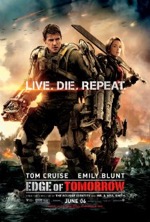
Starring: Tom Cruise
June 2014
This review was originally tweeted in Real-time from the back row of a movie theater and appears @BackRoweReviews. Though efforts were made to tease rather than ruin this movie’s memorable lines and moments, some spoilers may exist in the following evaluation. The original tweets appear in black, while follow-up comments appear in red. For concerns over objectionable content, please first refer to one of the many parental movie guide websites. All ratings are based on a four star system. Happy reading!

Sorry, couldn’t help myself.
A broad scale alien invasion. Didn’t we already see this in War of the Worlds...also starring Cruise?
Gleason orders Cruise to the beach...a second D-Day in France.
The motivation here seems a bit fuzzy. There must’ve been a more inventive way of forcing Cruise into the battle than this.
Paxton is from the foreign country Kentucky. Never heard of it.
Bill Paxton turns in a swaggering, southern fried role that’s truly unforgettable. His character has some of the best lines in the movie, although they do get tired after the second or third repetition.
Bowlegged troops invade the beach. You’d think they would’ve designed the suit with better ease of use.
Especially when considering how agile their enemy is.
Several Groundhog Day time loops and then Cruise is shown a “terrific presentation.”
Cruise wants to know if Blunt has “tried all options.” Humorous.
Actually, that would be the first option explored by any red-blooded male. Hey, the fate of the world is at stake, right?
Cruise on a motorcycle...the movie wouldn’t be complete without it.
Save for touching on the well-established Cruise trope, this scene was wholly unnecessary…and contrived.
The safety net is gone...now things are getting interesting.
In order for the story to kick into high gear this absolutely had to happen…and not a moment too soon since I was getting whiplash from repeatedly being yanked back to the beginning.
Must...swim...faster.
Final analysis: an original actioner that’s engaging despite its repetitious plot.
But hats off to the editing team. Piecing this film together must’ve required an entire pallet of Excedrin.
Not as entertaining as Oblivion, but still a decent yarn with some jaw-dropping action scenes.
Rating: 3 out of 4. If you disagree with my rating, don’t shoot me. Unlike Cruise, I can’t come back.
On the surface, the new Tom Cruise vehicle, Edge of Tomorrow, is a sci-fi/action riff on Groundhog Day (1993), the movie where Bill Murray wakes up every morning to the same song and the same day. This film is also reminiscent of ST:TNGs “Cause and Effect” which ended each act, save for the final one…of course, with the Enterprise exploding into scientifically impossible fiery bits in space. The crew discovers that they’re trapped inside a causality loop and that they’re doomed to keep repeating the same mistakes, which they do until the albino android figures out how to spring the ship from the temporal trap. In Edge, Cruise lives the same day over and over again and, like Murray’s character in Groundhog, finds that he can adapt, learn new skills and eventually figure a way out of the redundant riddle. It’s a deceptively simple premise, but beyond the trippy plot and mind-blowing FX, there’s a narrative depth here that one can sense more than readily identify. Clearly the film is engaging in a discourse on the nature of war, and the film’s release on the 70th anniversary of D-Day is far from coincidental. However, other social commentary is subtly broached here in a manner that’s nearly undetectable until it surfaces in the most startling fashion imaginable, much like the emergence of the movie’s maniacal Mimics. The obvious interpretation of the movie is that, like Inception (2010), the film is an attempt at creating a video game experience on the big screen (with gratitude to Henry Jenkins’ brilliant article on the subject entitled “No, You Do Not Have to Be a Gamer to Like Inception!”). Inception had multiple characters and levels, but Edge has one level with multiple lives that act as a reset button each time Cruise meets with an untimely demise. Although this is certainly a valid view of the movie, and don’t be surprised if you see blogs and articles written on the topic ad nauseam, I’d like to delve deeper into the movie’s multilayered mantle of meaning. Could it be that the movie holds up a mirror to our postmodern, post-911, post-economic meltdown society and projects back the anxieties and desperate exigencies of our lives? Cruise is a major in the army, but one day he wakes up to find that he’s a lowly private. In a similar reversal of fortunes, many in our country who once had white-collar jobs now have blue-collar jobs and have had to learn an entire new skill set in order to survive. We can sympathize with Cruise’s plight because we’ve all been affected, in one way or another, by the global economic recession. Many, like Cruise’s character, have fallen pretty far down the ladder from the once-powerful positions they enjoyed during the pre-recession period. In the same way that Cruise is trapped inside his repetitious nightmare, many people today are shackled by circumstances beyond their control and are prisoners inside their own lives. The drudgery of going to work, buying groceries and gas, paying bills and taxes, etc can feel like an unending cycle of sameness; a rote reality that’s really just an undiagnosed form of insanity. The movie’s poster is emblazoned with the slogan, “Live. Die. Repeat.” For many of our nation’s citizens, their life can be summed up as, “Wake up, go to work, come home, make supper, clean up, go to sleep, repeat.” So then, Cruise’s dogged insistence on reclaiming his autonomy and identity by breaking free from the seemingly preordained pattern of our existence should serve as a cathartic release for us…a powerful reminder that it’s possible to learn from our mistakes in the attempt at forging a better future. Director Doug Liman and his writers seem to be telling us that it’s tenable, with a good deal of ingenuity, dedication and sacrifice, to navigate through the treacherous terrain of our times and that the American Dream is still out there for those willing to fight like mad to attain it. In order to succeed, however, the assistance of others is required; even Cruise’s lone wolf character enlists the help of Rita (Emily Blunt) and Bill Paxton’s squad of elite soldiers during the movie’s climactic events. Cruise’s self-determination in spite of the impossibly rigid strictures of temporal mechanics also has much to say regarding rugged individualism versus the totalitarian state. This point could open up a whole discourse on the film’s politics, which I have neither the space nor inclination to address. Suffice it to say, the film invites multiple readings of its narrative, which makes it more complex and, therefore, more mentally stimulating than the standard action picture. In fact, the story is so involved that successive screenings are advised in order to fully appreciate the multifaceted plot and furiously filmed action sequences. How ironic, or insidious, that a film about a man stuck inside a time loop should invite repeat viewings. It’s almost as if Warner Bros. planned it that way.
Belle (PG)
05/06/14 22:55 Filed in: 2014
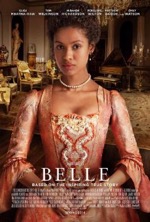
Starring: Gugu Mbatha-Raw
May 2014
This review was originally tweeted in Real-time from the back row of a movie theater and appears @BackRoweReviews. Though efforts were made to tease rather than ruin this movie’s memorable lines and moments, some spoilers may exist in the following evaluation. The original tweets appear in black, while follow-up comments appear in red. For concerns over objectionable content, please first refer to one of the many parental movie guide websites. All ratings are based on a four star system. Happy reading!

The premise is immediately established.
Most of what was shown in the trailer transpires in the first five minutes of the movie, which is a welcome change from the usual preview that ruins every key moment, line or action scene in a film. There’s something refreshing about being “cinematically blind,” not knowing what’s coming around the next bend story wise. It’s one of the many reasons why movies were so thrilling during the golden age of cinema.
Wilkinson and Watson puzzle over Belle’s future.
Belle’s real name is Dido, but I didn’t want to Tweet that name for fear of misspelling it to my own eternal shame and ridicule.
Whispering in French raises auntie’s ire.
Good moral debate over human cargo.
It’s unbelievable to think that we once had arguments over such an issue…that there actually could be two legitimate sides on such a topic.
“Coming out” meant something completely different in those days.
“Wait for no man, dear.” Ha!
The seeds of women’s lib?
“Just as in life, we’re no better in paintings.” Poignant.
I must say that I don’t recall ever having seen a painting from this era with a person of African descent featured in it before seeing the many such paintings displayed in this film. But I’m certainly not an art connoisseur from the period in question…or any other for that fact.
James is a creep...the “manhandled” scene is repulsive.
Argument in carriage is intense.
I don’t think I’d ever lock horns with Wilkinson. Remember when he went off on George Clooney in Michael Clayton (2007)? “I am Shiva, the god of death.” Now that’s gravitas.
Wilkinson sees himself in a fiery young politician. A superb scene.
“Let justice be done though the heavens may fall.” Wilkinson’s ruling is an amazing moment.
A great quote, but an even better scene. The verdict isn’t nearly as epic as the one in To Kill a Mockingbird (1962), but it’s still provides a rousing resolution.
Final analysis: a deeply-affecting true story that tackles such heavy issues as racism & slavery in the late 1700s.
Rating: 3 out of 4 stars. Splits its time between familial and political intrigue. A moving, inspiring tale.
This isn’t the first “true story” film to highlight events during the pre-Victorian period. This certainly isn’t the first movie to feature matchmaking mothers intent on marrying off their daughters to this rich relative or that powerful duke…look no further than Jane Austen’s Pride and Prejudice (1940) for a master class on the subject. This also isn’t the first film to spotlight the social blight of slavery during this time period; one really good story on the subject is that of humanitarian William Wilberforce in Amazing Grace (2006). What is new here is the story of a young black woman who grows up on an estate with a staid, white, aristocratic family. Imagine dropping a black girl into Downton Abbey and the effect would be about the same. Dido’s (Gugu Mbatha-Raw) plight, which immediately creates identification and pathos in the audience, is the one plot point that keeps the movie from being just another finely mounted, well acted costume drama. Her struggle for acceptance and equality is inspiring and captivating: we can only imagine what Dido endured as someone too good to eat with the servants but not good enough to eat with her “family.” The social commentary, which is chiefly preoccupied with human rights, is subtle throughout and we can thank Misan Sagay that the writing never gets heavy-handed. It goes without saying that the acting is amazing, but it’s worth mentioning just the same. Wilkinson and Watson are well suited as Dido’s adoptive parents and Mbatha-Raw is a revelation as the delightful yet redoubtable title character, a brave woman who fights for self-respect while fighting for the fate of her race. In the end, the movie succeeds because there are many familiar features from other such period pieces to make the story accessible along with enough new elements to keep us engaged and entertained from the outset. Add this to the pantheon of well acted, well produced and well written historical dramas.
The Lego Movie (PG)
02/06/14 23:42 Filed in: 2014
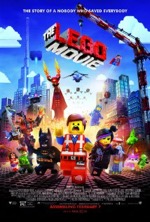
Starring: Will Arnett
February 2014
This review was originally tweeted in Real-time from the back row of a movie theater and appears @BackRoweReviews. Though efforts were made to tease rather than ruin this movie’s memorable lines and moments, some spoilers may exist in the following evaluation. The original tweets appear in black, while follow-up comments appear in red. For concerns over objectionable content, please first refer to one of the many parental movie guide websites. All ratings are based on a four star system. Happy reading!

Everything is already done for you…which some would say is the downfall of movies.
LOTR style opening. A wizard recounts a prophecy...in rhyme.
Everything is awesome...until Emmett tries following a woman into a construction site.
Many men have rushed headlong into destruction while pursuing a woman, so it’s not just a Lego thing. Correction: Emmet.
Wild Style and The Special land in the Old West.
Nope, there’s no time for them to say howdy to Rango. Correction: Wyldstyle.
The meeting of master builders is attended by many familiar figures, including the wizard Double Door.
A really funny play on words. The assembly is chockfull of familiar faces from many different franchises.
The double-decker couch actually serves a purpose.
Batman hitches a ride on the Millennium Falcon. Funny scene.
In what other movie can you find such a scene? The “They’re all guys” bit is a hoot.
The Bat pun is humorous.
The deadpan delivery by Will Arnett, who actually does a respectable job of voicing the Caped Crusader, is absolutely perfect.
Will Farrell meets his alter ego. Results in a touching scene.
Final analysis: some funny moments along with the pedestrian ones. A nice emotional payoff at the end.
Rating: 2 1/2 out of 4 stars. Not hard to see this becoming a franchise with the myriad sets to choose from.
The animated films that tend to endure are those that work on two levels: cute and funny for the kids, witty and emotionally complex for adults. Pixar has long been the exemplar for how to simultaneously cater to kids and adults in the same movie, but other animation studios have gradually found their own way in achieving this multidimensional storytelling method. The Lego Movie does an excellent job of servicing the different generations in the audience with whip smart humor and pulse-pounding action sequences. Many of the “adult” jokes, some of which contain biting political commentary, will fly right over the heads of younger viewers. That’s okay, because there’s plenty for the youngsters to enjoy here, not the least of which is seeing many of their favorite heroes hanging out together on the big screen. Characters from the Batman, Star Wars, Lord of the Rings and Harry Potter franchises all peacefully coexist in this mash-up mayhem, but a pair of original characters, Emmet (Chris Pratt) and Wyldstyle (Elizabeth Banks), drive the story’s action. And then there’s schizoid Good Cop/Bad Cop (Liam Neeson), who steals the show with his mercurial moods and vacillating voices. The voice cast is beyond stellar, including Morgan Freeman, Will Ferrell, Jonah Hill, Channing Tatum and Cobie Smulders, to name just a few. It’s an added treat to hear actors voicing their original characters like Billy Dee Williams as Lando and Anthony Daniels as C-3PO. The final ten minutes close out the movie with a heartwarming resolution, which, for this adult, tied things up with satisfactory emotional closure. There are myriad creative avenues for the writers to explore in the inevitable sequel. We’ll just have to wait and see what new adventure they come up with…or, if we don’t want to wait that long, we can create our own sequel with the Legos we have hidden in the shoebox in the corner of the closet. I won’t tell if you won’t.
Transcendence (PG-13)
01/06/14 15:41 Filed in: 2014
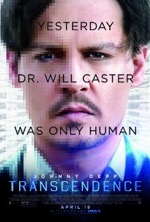
Starring: Johnny Depp
April 2014
This review was originally tweeted in Real-time from the back row of a movie theater and appears @BackRoweReviews. Though efforts were made to tease rather than ruin this movie’s memorable lines and moments, some spoilers may exist in the following evaluation. The original tweets appear in black, while follow-up comments appear in red. For concerns over objectionable content, please first refer to one of the many parental movie guide websites. All ratings are based on a four star system. Happy reading!

It sounded good at the time.
Bettany in a bleak Berkley. Narration decries the downside of technology.
Meaning its ability to take control of our society. Have we learned nothing from Skynet?
Castor wants to create his own god. Hmm... Something tells me that won’t end well.
His comment that all of science is the attempt at becoming God is revealing and somewhat ironic when considering what’s to come for his character in the movie. With statements like that is there any wonder why there’s such a huge rift between religion and science? Correction: Caster.
PINN is the new KIT, but with a lot more computational power.
And not housed inside a car. Minor detail. Correction: KITT.
Now those closest of Castor play God by trying to save his life.
And nobody, not even his wife, thinks this is a bad idea? This is what happens when people stop reading science fiction. Or reading period.
Depp looks creepy in electrode curlers.
But still not as creepy as his chalk complexioned character in Charlie and the Chocolate Factory (2005).
Why does Kate Mara always play a nut job?
Remember her turn as a psycho B on 24?
Castor tells his wife they need to get off the grid. Uh...he is the grid.
Ominous note: Run from this place.
Evelyn still doesn’t take Tagger’s hint. Maybe if he’d written, “Run for you life,” his message would’ve gotten across more clearly.
These guys heal quicker than Wolverine.
Nano rain. Now we’re drifting too close to #Revolution.
This sequence boasts some of the best FX in the movie.
Creepy townsfolk reminds me of Invasion of the Body Snatchers.
They’re really just zombies that look like normal people, which is exactly how zombies looked in 50s movies like the one listed above.
Final analysis: a standard cautionary tale of technology running amok.
Offers some food for thought, but it’s more like a light snack.
Rating: 2 out of 4 stars. Squanders its fine cast with farcical fare. Can you prove you’re self aware?
This movie is a profound disappointment. Longtime cinematographer for Christopher Nolan and first time director, Wally Pfister, drew the short straw on this project. Pfister frames a few nice shots in the movie (especially the rows of solar panels), but the movie’s ordinary, rundown and non-cinematic locales lend the whole proceedings a low budget look. The leaden script from Jack Paglen had no chance of becoming the edgy, poignant, mind trip the movie aspires to be…Inception it’s not. Besides being derivative of many other sci-fi works, The Terminator and ST:TNG’s “The Schizoid Man” among many possible choices, the story is so outlandish that suspending one’s disbelief still doesn’t help relegate it to the realm of reason…or reality. Depp’s performance is muted and uninspired: his slump continues and this just might prove to be his least successful movie ever. Morgan Freeman does the most he can with a cardboard character and Paul Bettany plays a scientist whose shifting motivations are contrived and disingenuous. Rebecca Hall, who turns in the movie’s most sincere and convincing performance, can’t quite sell us on her motivation behind preserving the essence of her husband. This story embodies the age-old axiom of absolute power corrupting absolutely but adds nothing new to the hackneyed formula. The movie flirts with having a message, but the execution of the anemic story line prevents any such notions from gaining traction. What’s unfortunate is that the story actually had the kernel of a compelling idea. Unfortunately, that kernel never turned into something white, fluffy and delicious. Instead, it resides at the bottom of your popcorn bucket with all the other old maids.